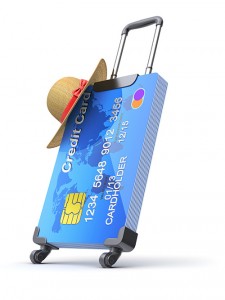 Summer vacations allow us to unwind, see new things, and even meet new people. As you plan your vacation, it is important to think how you are going to pay for it. With more Americans traveling overseas, you’ll need to plan for currency exchange and whether your credit cards will work in a foreign country. This post will sort out the facts of foreign travel and will hopefully prepare you for a stress-free vacation.
Summer vacations allow us to unwind, see new things, and even meet new people. As you plan your vacation, it is important to think how you are going to pay for it. With more Americans traveling overseas, you’ll need to plan for currency exchange and whether your credit cards will work in a foreign country. This post will sort out the facts of foreign travel and will hopefully prepare you for a stress-free vacation.
Foreign Exchange
I have traveled to various countries and continents around the world and my approach to money has changed dramatically. Years ago I used to go to my local bank and get all of the cash I thought I needed, in the local currency. If I were to visit multiple countries I would have to estimate the cash needed for each country. Before the Euro, I had to carry marks, pounds, and francs at the same time. If I ran out before I left the country, then I had to navigate the local currency exchange (often with a hefty fee) or the local banking system. This system was clumsy at best.
The Miracle of ATMs
The first time I used an ATM in a foreign country was in a dark alley in Dublin. I was totally amazed when the screen flashed my name and asked me the nature of my transaction. I knew then that technology was totally awesome. I was in a foreign country far from home, yet the machine knew who I was and gave me money in local currency after determining I had that money in my account. The system, the networking, and the applications all had to work together to make this magic. That was the last time I visited a currency exchange at my bank, the airport, or a train station. I was hooked.
Who Carries Cash?
Fast-forward to today and I rarely carry cash. With the worldwide network of credit card and debit card receiving terminals there is no need to carry large sums of cash. I usually get enough cash at the foreign airport ATM to pay the taxi driver and for small purchases, but outside of that I rely on my credit and debit cards. For foreign travel though, that brings up the question of whether the American issued credit card will work. Possibly not.
Chip and PIN vs. Chip and Signature vs. Magnetic Swipe
Many countries, including those in Europe and Asia, adhere to the EMV (Europay, Mastercard, Visa) standard of electronic transactions. This requires a chip and PIN type card, but many still accept chip and signature and possibly, but not necessarily, the old magnetic swipe cards. A chip and PIN system requires a PIN number to unlock the information embedded in the card. A chip and signature terminal can decode the information on the chip but does not ask for a PIN number and requires a live signature instead. The magnetic swipe has the user information embedded on the magnetic strip and requires a swipe and a signature. The newer cards being issued in America generally are the chip and signature variety. While it is a step in the right direction towards EMV standards, it is only a half measure and may not always work abroad. Consider the situation of needing to purchase a train ticket from a kiosk in Vienna in the middle of the night. That kiosk has no way to collect your signature so you could be spending a cold night in the station while waiting for the ticket office to open in the morning.
What About RFID?
One of the concerns about travel is rogue Radio Frequency Identification (RFID) scanners. Some credit cards have embedded RFID with credit card information. All U.S. passports since 2007 also have an embedded RFID chip. To be clear, this is not the same thing as the chip in a chip and PIN or chip and signature card. Popular RFID credit cards are Visa PayWave, MasterCard PayPass, American Express ExpressPay, and Discover Zip, and they generally carry a symbol of four wavy lines. You will find the same chip in many electronic lock systems. The advantage of these is that you can bump the card against or near the transaction scanner without having to remove it from your wallet. The disadvantage is that others with a scanner close enough to you, generally two feet, can also read and copy your information. There are a lot of solutions for blocking that data collection, from special wallets to Tyvek and aluminum card sleeves. My favorite is the homemade duct tape wallet with built in RFID block (tin foil). Before you invest in anything, make sure that your card even has an RFID embedded chip. I believe that with the advent of electronic pay systems such as Apple Pay and Android Pay, these cards will fade from use, as will the security concerns.
Thoughts
These are some things to think about as you plan your travels this summer. The world is a big place but it is becoming smaller through technology. Just when you think you may be in unchartered territory you will be surprised, as I was years ago when I walked into the terminal at the Frankfurt airport and was greeted by a big sign that said “American Express Welcomes You To Frankfurt.” They obviously got there before me.
I hope you will share your travel experiences this summer and any tips that you have to make the process uneventful so that you can fully enjoy the experience.
Kelly Brown is an IT professional and assistant professor of practice for the UO Applied Information Management Master’s Degree Program. He writes about IT and business topics that keep him up at night.



